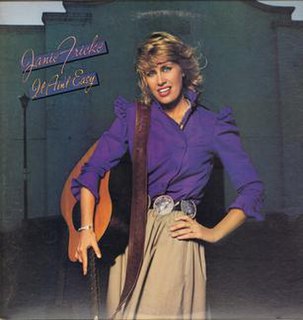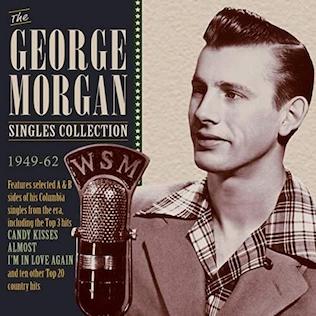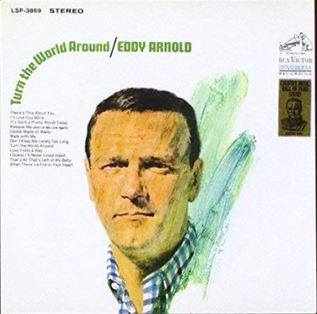Related Research Articles
"Ruby, Don't Take Your Love to Town" is a song written by Mel Tillis about a paralyzed veteran who lies helplessly as his wife "paints [herself] up" to go out for the evening without him; he believes she is going in search of a lover. As he hears the door slam behind her, he claims that he would murder her if he could move to get his gun, and pleads for her to reconsider. A line in the song about a "crazy Asian war" and the time of the song's release led to the assumption the song was about a veteran of the Vietnam War, though this was never stated in the lyrics. However, Tillis stated that the song was about a veteran of World War II.
"To Each His Own" is a popular song with music written by Jay Livingston and lyrics by Ray Evans. It is the title song of the movie of the same name and was published in 1946 by Paramount Music. They were assigned to write this song after film composer Victor Young turned it down.
"I Really Don't Want to Know" is a popular song written by Don Robertson (music) Howard Barnes (lyrics). The song was published in 1953.

"You Don't Know Me" is a song written by Eddy Arnold and Cindy Walker in 1955. "You Don't Know Me" was first recorded by Arnold that year and released as a single on April 21, 1956, on RCA Victor. The best-selling version of the song is by Ray Charles, who took it to number 2 on the Billboard Hot 100 chart in 1962, after releasing the song on his number 1 album Modern Sounds in Country and Western Music. The first version of the song to make the Billboard charts was by Jerry Vale in 1956, peaking at number 14 on the pop chart. Arnold's version charted two months later, released as an RCA Victor single, 47–6502, backed with "The Rockin' Mockin' Bird", which reached number 10 on the Billboard country chart. Cash Box magazine, which combined all best-selling versions at one position, included a version by Carmen McRae that never appeared in the Billboard Top 100 Sides listing.

"Misty Blue" is a song written by Bob Montgomery that has been recorded and made commercially successful by several music artists. Although Montgomery wrote the song for a different artist in mind, it was brought first to the attention of Wilma Burgess in 1966. It was recorded by Eddy Arnold the following year, both versions were top 5 Country Hits. A decade later, blues artist Dorothy Moore released the highest-charting version of the song and it reached the top ten in several different radio formats. Following Moore's revival of the track, numerous artists re-covered the tune, including country artist Billie Jo Spears. Spears's version would also go on to become a successful single release. Numerous other artists and musicians of different genres have recorded their own versions of "Misty Blue". The song is now considered both a country music and blues standard.

"You Win My Love" is a song recorded by Canadian country music singer Shania Twain. It was released in January 1996 as the fifth single from her second studio album The Woman in Me (1995). The song was written single-handedly by Robert John "Mutt" Lange, making it one of her few singles that Twain did not co-write. The song became Twain's third No. 1 hit at country radio, and like the previous single "(If You're Not in It for Love) I'm Outta Here!", a new remix was done by Lange for pop and international promotion. It spent two weeks at the top of the Billboard Hot Country Songs chart in May 1996, before taking a considerably large drop to No. 11. It was originally released to radio in early 1996, the song was also released as a single in Australia.

It Ain't Easy is a studio album by American country artist Janie Fricke. It was released in September 1982 via Columbia Records and contained ten tracks. The disc was the seventh studio release of Fricke's career and reached the top 15 of the American country LP's chart. The album spawned three singles. Two of its singles "You Don't Know Love" and "He's a Heartache " reached the number one spot on the North American country songs charts.

"Don't Pull Your Love" is a song written by Brian Potter and Dennis Lambert which became a top ten hit single in 1971 for Hamilton, Joe Frank & Reynolds.
Wayne Carson, sometimes credited as Wayne Carson Thompson, was an American country musician, songwriter, and record producer. He played percussion, piano, guitar, and bass. His most famous songs as a writer include "The Letter", "Neon Rainbow", "Soul Deep", and "Always on My Mind".
"You Gave Me a Mountain" is a song written by country singer-songwriter Marty Robbins during the 1960s. It has been recorded by many artists, including Robbins himself, but the highest-charting version of the song was by Frankie Laine in 1969. This version was included on Laine's album of the same name.

"Then You Can Tell Me Goodbye" is a song written by John D. Loudermilk. It was first released in 1962 by Don Cherry, as a country song and again as a doo-wop in 1967 by the group The Casinos on its album of the same name, and was a number 6 pop hit that year. The song has since been covered by Eddy Arnold, whose version was a number 1 country hit in 1968, and by Neal McCoy, whose version became a Top 5 country hit in 1996.
"I'll Hold You in My Heart " is a 1947 song by Eddy Arnold. The song was Eddy Arnold's third number one on the Billboard Juke Box Folk Records chart. "I'll Hold You in My Heart " spent 46 weeks on the chart and 21 weeks at number one. The song also served as Arnold's first crossover hit, peaking at number 22 on the Billboard Best Sellers in Stores chart.
"Bouquet of Roses" is a 1948 song written by Steve Nelson (music) and Bob Hilliard (lyrics). It was originally recorded by Eddy Arnold and his Tennessee Plow Boys and his Guitar in Chicago on May 18, 1947. It was released by RCA Victor as catalogue number 20-2806 and by EMI on the His Master's Voice label as catalogue numbers BD 1234 and IM 1399. "Bouquet of Roses" was Eddy Arnold's third number one in a row on the Juke Box Folk Record chart and spent 19 weeks on the Best Selling Folk Records chart. In 1949, when RCA Victor introduced its new 45 RPM single format this record was among seven initial releases and the first in the Country and Western category. Arnold would re-record "Bouquet of Roses" several times during his career.

"Candy Kisses" is a 1949 song written and first recorded by American country crooner George Morgan. "Candy Kisses" was George Morgan's debut release on the charts and was his only #1 on the Best Selling Folk charts, where it stayed for three weeks. The B-side of "Candy Kisses", a song entitled, "Please Don't Let Me Love You" reached #4 on the same chart.
"I Walk Alone" is a song written by Herbert Wilson. and recorded by American country music artist, Eddy Arnold and was the B-side of his 78 rpm single "Did You See My Daddy Over There" (1945), and later for his compilation album Eddy Arnold Sings Them Again (1960).
Seymour "Cy" Coben was an American songwriter, whose hits were recorded by bandleaders, country singers, and other artists such as The Beatles, Tommy Cooper and Leonard Nimoy.

I Want to Go with You is a studio album by American country music singer Eddy Arnold released by RCA Victor in 1966. It reached #1 in the US country charts and #26 in the Billboard 200 charts. Released as a single in early 1966, the title track "I Want to Go with You" peaked at #36 on the Billboard Hot 100 chart. It was more successful with country and adult contemporary audiences, reaching #1 on both the Billboard country chart for six weeks and the easy listening chart for three weeks.
"Take Me in Your Arms" is a country music song written by Cindy Walker, sung by Eddy Arnold, and released on the RCA Victor label. In December 1949, it reached No. 1 on the country juke box chart. It spent 17 weeks on the charts and was the No. 7 juke box country record of 1950.

Turn the World Around is a studio album by country music singer Eddy Arnold. It was released in 1967 by RCA Victor.

Somebody Like Me is an album by American country music singer Eddy Arnold. It was released by RCA Victor in 1966.
References
- ↑ Whitburn, Joel (2004). The Billboard Book Of Top 40 Country Hits: 1944-2006, Second edition. Record Research. p. 30.
- ↑ "1953's Top C & W Records". The Billboard. December 19, 1953. p. 29.